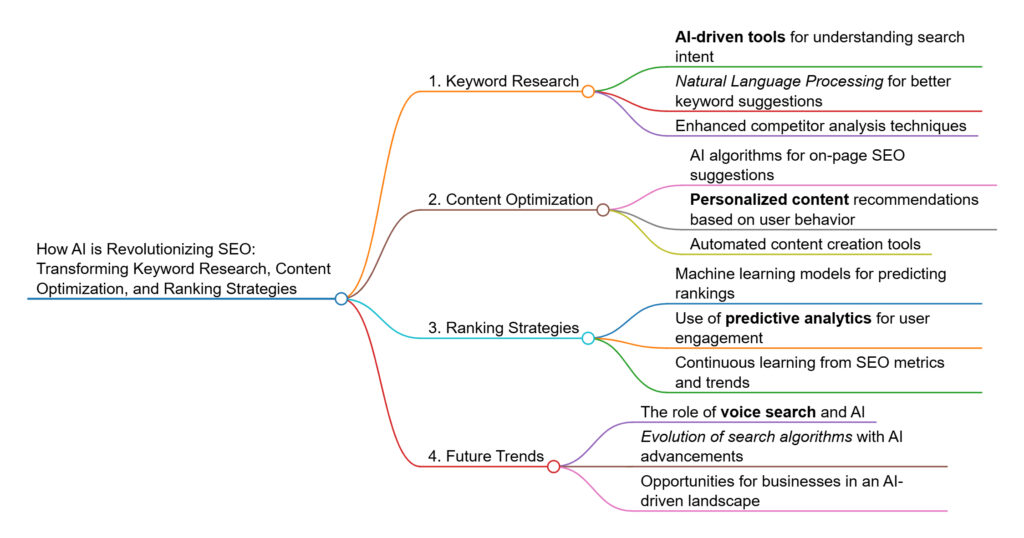Search Engine Optimization (SEO) has always been a dynamic field, evolving with the changing algorithms of search engines like Google. However, the advent of Artificial Intelligence (AI) has brought about a seismic shift in how SEO is approached. From keyword research to content optimization and ranking strategies, AI tools are transforming the landscape, making SEO more efficient, accurate, and effective. In this blog post, we’ll explore how AI is revolutionizing SEO and what it means for marketers, content creators, and businesses.

The Role of AI in Modern SEO
AI refers to the simulation of human intelligence in machines that are programmed to think and learn like humans. In the context of SEO, AI tools are designed to analyze vast amounts of data, identify patterns, and make predictions that can help optimize websites for better search engine rankings.
1. AI-Powered Keyword Research
Keyword research has always been the cornerstone of SEO. Traditionally, marketers relied on manual methods and tools like Google Keyword Planner to identify relevant keywords. However, AI has taken keyword research to a whole new level.
a. Semantic Search and Natural Language Processing (NLP)
AI-powered tools like Google’s BERT (Bidirectional Encoder Representations from Transformers) have revolutionized how search engines understand user queries. BERT uses Natural Language Processing (NLP) to comprehend the context and intent behind search queries, rather than just focusing on individual keywords.
For SEO professionals, this means that keyword research is no longer just about finding high-volume keywords. Instead, it’s about understanding the intent behind those keywords and creating content that aligns with user needs. AI tools can analyze search patterns, identify long-tail keywords, and even predict emerging trends, allowing marketers to stay ahead of the curve.
b. Predictive Analytics
AI-driven tools like MarketMuse and SEMrush use predictive analytics to forecast which keywords are likely to perform well in the future. These tools analyze historical data, search trends, and competitor strategies to provide actionable insights. This allows marketers to focus on keywords that not only have high search volume but also have the potential to drive traffic and conversions.

2. Content Optimization with AI
Creating high-quality content is essential for SEO, but optimizing that content for search engines can be a complex and time-consuming process. AI tools are making content optimization more efficient and effective.
a. Content Generation and Enhancement
AI-powered content generation tools like GPT-3 (Generative Pre-trained Transformer 3) can create high-quality content in a matter of seconds. These tools use machine learning algorithms to generate text that is not only grammatically correct but also contextually relevant.
While AI-generated content should not replace human creativity, it can be a valuable resource for generating ideas, creating drafts, or even optimizing existing content. Tools like Jasper and Writesonic can help marketers produce content that is optimized for SEO, ensuring that it includes relevant keywords, meta descriptions, and headers.
b. On-Page SEO Optimization
AI tools like Surfer SEO and Clearscope analyze top-performing content for a given keyword and provide recommendations for optimizing your own content. These tools consider factors like keyword density, content length, and readability to ensure that your content is fully optimized for search engines.
For example, Surfer SEO uses AI to analyze the top 10 search results for a specific keyword and provides a detailed report on how to optimize your content to rank higher. This includes suggestions for keyword placement, heading structure, and even the ideal word count.
c. Content Personalization
AI is also enabling a more personalized approach to content creation. By analyzing user behavior, preferences, and search history, AI tools can help marketers create content that resonates with their target audience. Personalized content not only improves user engagement but also increases the likelihood of conversions.
3. AI-Driven Ranking Strategies
Ranking on the first page of search engine results is the ultimate goal of any SEO strategy. AI is playing a crucial role in helping businesses achieve this goal by providing insights into ranking factors and optimizing strategies accordingly.
a. Rank Tracking and Analysis
AI-powered rank tracking tools like Rank Math and Ahrefs provide real-time data on how your website is performing in search engine results. These tools use machine learning algorithms to analyze ranking trends, identify fluctuations, and provide actionable insights.
For example, if your website’s ranking drops for a particular keyword, AI tools can analyze the possible reasons behind the drop and suggest corrective actions. This could include optimizing your content, improving your website’s loading speed, or building more backlinks.
b. Backlink Analysis and Outreach
Backlinks are a critical factor in SEO, and AI is making it easier to build high-quality backlinks. AI tools like BuzzStream and Pitchbox use machine learning algorithms to identify potential link-building opportunities and automate the outreach process.
These tools analyze your website’s backlink profile, identify gaps, and suggest websites that are likely to link back to your content. They can also automate the outreach process by sending personalized emails to potential link partners, saving you time and effort.
c. Technical SEO Optimization
Technical SEO involves optimizing the backend of your website to improve its performance in search engine results. AI tools like Botify and DeepCrawl use machine learning algorithms to identify technical issues that could be affecting your website’s ranking.
For example, these tools can analyze your website’s crawlability, indexability, and loading speed, and provide recommendations for improvement. By addressing these technical issues, you can ensure that your website is fully optimized for search engines.
4. The Future of AI in SEO
As AI continues to evolve, its impact on SEO is only expected to grow. Here are some trends to watch out for:
a. Voice Search Optimization
With the rise of voice assistants like Alexa and Siri, voice search is becoming increasingly popular. AI-powered tools are helping marketers optimize their content for voice search by focusing on conversational keywords and natural language.
b. Visual Search Optimization
Visual search is another emerging trend, with platforms like Pinterest and Google Lens allowing users to search for products using images. AI tools are helping marketers optimize their visual content by analyzing image metadata, alt text, and other factors that influence visual search rankings.
c. AI-Driven User Experience (UX) Optimization
User experience is a critical factor in SEO, and AI is helping businesses create more engaging and user-friendly websites. AI tools can analyze user behavior, identify pain points, and provide recommendations for improving the overall user experience.
Conclusion
AI is undoubtedly revolutionizing the field of SEO, making it more data-driven, efficient, and effective. From keyword research and content optimization to ranking strategies, AI tools are providing marketers with the insights and automation they need to stay ahead of the competition.
As AI continues to evolve, it’s essential for businesses to embrace these technologies and integrate them into their SEO strategies. By doing so, they can not only improve their search engine rankings but also create a more personalized and engaging experience for their users.
The future of SEO is here, and it’s powered by AI. Are you ready to take your SEO strategy to the next level?
